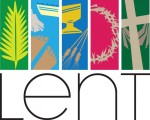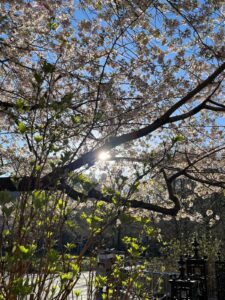 This year as part of my Lenten practice I am reading a poem every day from the book The Heart’s Time, compiled by the wonderful English liturgist Janet Morley. She says this about poetry, whether written with conscious religious intention or not:
This year as part of my Lenten practice I am reading a poem every day from the book The Heart’s Time, compiled by the wonderful English liturgist Janet Morley. She says this about poetry, whether written with conscious religious intention or not:
“It is common for a poem to examine something familiar in such a way that it becomes newly strange. Applied to religious truth, this denies us the comfort of taking refuge in formulae. Poetry helps us in the process of ‘unlearning’, which is a necessary part of the spiritual journey.”
It strikes me that this is especially appropriate in Lent — which is a time of “unlearning”: letting go of what we are sure we know, the familiar and the formulaic, offering ourselves to the surprises of God’s Spirit that we may be broken open, unmade and renewed.
This morning’s gospel takes us again to the first few verses in Mark — a passage, I have to say, that I feel like I have been hearing over and over in the last few weeks. This morning, however, we ponder the baptism of Jesus and its aftermath through the lens of Lent, aware of the themes of unlearning and undoing. I feel the disorientation in the scene, the unexpected, even violent movement as the heavens are torn open and the Spirit comes and the voice from heaven claims Jesus in what have to be extremely confusing words even if they also feel deeply true: “You are my Son, the Beloved.”
Without even a pause for breath, immediately (as Mark will have it), the Spirit drives Jesus out into the wilderness. Out into a place of disorientation; spare and strange. Here are dangers, but here also is space: room to breathe, room to hear the voices clamoring inside and the howling of the wind, room to wrestle and see what emerges without the pressure of ordinary human expectations and interactions.
Spirit-driven, in the wilderness for 40 days (a biblical way of saying “a long time” and connecting this experience with others in the tradition, including those who rode the wild waters of the flood for 40 days in the ark and the Israelites who wandered in the wilderness for 40 years), Mark tells us Jesus was tempted by Satan, the adversary.
Unlike the other gospel writers, Mark does not describe the content of Jesus’ temptations. Wrestling as he was to try to understand the enormity of the love that had claimed him and the vocation that was calling to him out of that love, it makes sense that he struggled to understand what God wanted of him, how to use his authority in service to God and humanity rather than for self-aggrandizement. How to stay connected and humble. I like the fact that Mark gives us no details — that means we can supply our own.
What temptations come up when you have a moment of wilderness?
Often, if I let myself, I notice how I am tempted to keep my heart closed and hard: the judgments, the grandiosity or self-hatred, the numbing. I gradually recognize how I shut down in the face of too much demand and need, the ways I give in to despair or take the easy way out. The ways I don’t care for myself and so can’t care for others. The ways I skimp on my vocation — to love lavishly and wildly and with trust in God’s love for me.
Wrestling in the wilderness can be hard work, but it is also a gift: open, empty space to see and hear and feel what we normally do not. Not only temptation, not only grief and struggle and the need for repair, but also unexpected joy and hidden truth. Startling cloud formations and tiny brilliant wildflowers, curious scurrying lizards and precious water sources. Or, in the wilderness that is snow and cold, the sudden flash of red that is the first cardinal.
That reminds me of the next line of the gospel, which is also unique to Mark’s temptation account: “He was with the wild beasts.”
One way to hear this, of course, is that the beasts were one of the dangers Jesus faced in the desert — large, hungry animals, tiny stinging ones, slithering venomous ones. Maybe. But I think Mark is suggesting something quite different — more like an undoing of the curse of the fall as a result of Jesus’ time in the wilderness: the prophetic vision of the peaceable kingdom restored.
It reminds me of the saints of the 4th and 5th centuries known as the desert fathers and mothers, who sought silence and solitude in the deserts of North Africa and Palestine in order to devote themselves to prayer and come to know God in the vast emptiness. Ascetic though they were, the stories about them include some marvelous quirky examples of humanity and humor, often involving animals. Belden Lane, in his study of mountain and desert spirituality, The Solace of Fierce Landscapes, tells of Abba Theon, who let gazelles and goats drink from his cup; Abba Macarius who was “nursed to strength by a wild antelope and later returned the favor by healing the blind pup of a hyena”; and Paul the Hermit, who “was so beloved by desert lions that two of them came at his death to bury him with honor.”
This is whimsical, indeed. But it reveals an intuition, both in the temptation narrative and in the stories of the saints, that our wholeness — the healing we seek in Lentinvolves finding “our place in the family of things” (to use Mary Oliver’s phrase). This is not to romanticize the terror and danger of the wilderness. It is wild, after all. But rather it is to set the story, and our Lenten journey, in a very large context. Along with the wild beasts, Mark says, angels were there with Jesus, ministering to him after or maybe during the temptation. Divine messengers, unseen allies and guides, and an ecology of the whole.
This same sense of context — the family of things, the whole of creation — is of course present in today’s first lesson too: the story of Noah, after the building of the ark, the tender preservation of animals of every kind, the devastating flood, the long, long voyage and the dove sent out to find dry land finally returning with an olive branch in her mouth, the gradual receding of the waters of destruction. All that has happened, and now God makes a covenant — not just with Noah, but with all flesh. ALL flesh. Those words are repeated seven times in this passage: the everlasting covenant that is between God and every living creature of all flesh that is upon the earth.”
How, with this lesson, could I not preach about ecology? It is the most critical issue of our time, precious to my heart, and it is all here: the threat of rising water and changing climate, the invitation to repent and the call to join God in the rainbow covenant, caring for all flesh, preserving the earth from destruction.
That call surely includes a Lenten unlearning: unlearning old ways of heedless consumption and spurious self-sufficiency, heeding the suffering of those most impacted by climate change, which is to say the world’s poor; waking up to our responsibility for those who will come after us; turning from the mockery of creating arklike fortresses that will only preserve a few to seek a sustainable life for all. This call, this repentance, this devotion, is worth our lives and will take our lives. It is necessary for us as Christians and as human beings.
But this first Sunday of Lent, as I ponder the Noah story through the lens of unlearning, I am struck that the character who changes the most is God. Several chapters of Genesis ago, God, seeing the evil of which humankind is capable — the murder and violence, corruption, hatred and betrayal — came to regret creating people, and decided to destroy them. That is the driving force of the flood story — God’s decision to bring the creation to ruin. Nevertheless, Noah, his family, and life itself are preserved in the precious, precarious ark. And after the flood waters recede, God considers the frailty of the human, and says, “as for me, I am establishing my covenant with you… never again to destroy the earth.”
Can you feel the remarkable shift in the character of God — the discovery, the decision that the earth and its inhabitants, flawed though they are, are worth saving? Worth an unequivocal commitment? For the covenant is entirely God’s initiative, without requirement or qualification.
The rainbow is the sign. “I will set my bow in the clouds, and it shall be a sign of the covenant between me and the earth.” It’s such a wonderful image — embraced by environmentalists as a sign of the robust diversity of creation, claimed by the LGBT community to symbolize the rich inclusiveness of our humanity as well.
But in Genesis, the bow God sets in the clouds is a bow of war, from which the deity shot arrows of lightening in the midst of the storm. The rainbow is a sign that God has disarmed; has let go of the strategy of destruction because the earth is worth saving. “Never again”, says God. God sees the ephemeral beauty and color of the rainbow, and remembers, and is vulnerable in love for, commitment to, all flesh. That means, of course, God is vulnerable to a broken heart, as lovers are.
Might we unlearn an outworn image of God this Lent?
Can we let in the divine tenderness, the love for all flesh, for each one? Can we let that love pierce our denial and despair? It offers us hope as fresh and fragile as the sprig of an olive branch in the beak of a dove, as gorgeous and mysterious as a rainbow, as strong as God’s eternal promise. It surrounds us with strange, wild allies and guides. It declares us broken, beautiful, beloved, infinitely worth saving.
After John has been arrested — an ominous event for all who knew how his preaching threatened the powers of empire — Jesus emerges from the wilderness, proclaiming that God has come near. Does he come, I wonder, with a heart broken by the loss of John? He must have come with a new vulnerability, for sure, with the desert experience strong within him — with the immense space in his soul that makes room for all flesh, and for all that human beings struggle, suffer and celebrate. He comes yearning to share the good news that the world is infinitely worth saving. Despite our failures and flaws: you and I and all.
This Lent, we too are invited to wrestle with the adversary in the desert within (and maybe without — who knows?). We are offered the gift of space in which we may unlearn some of what we know about who God is and who we are: all that is too closed, too cramped, too small. We may be broken open, the better to cherish the world, wild beasts and all. May the Spirit drive us insistently into that great unknown.
Who knows what will emerge in our Lenten wilderness?
Preached at the Church of the Ascension on Sunday, February 22, 2015




